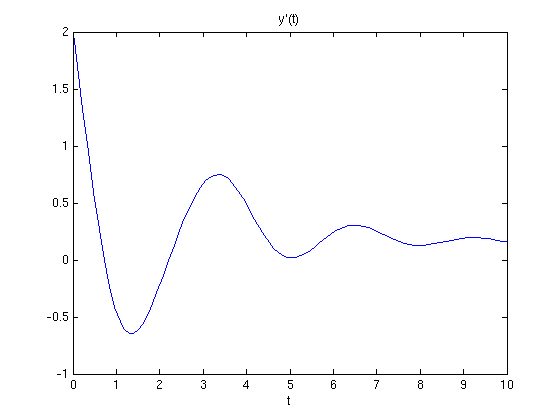Solution Exam 2
Contents
Problem 1
Define the function f:
format compact
f = @(t,y) [y(2) ; t-y(2)-y(1)^2];
Problem 1(a)
One step of Euler Method:
t0 = 0; y0 = [1;2];
h = 1/2;
s1 = f(t0,y0)
y1 = y0 + h*s1
answer = y1(2) % y' is given by 2nd component
s1 =
2
-3
y1 =
2.0000
0.5000
answer =
0.5000
Problem 1(b)
One step of Improved Euler Method:
t0 = 0; y0 = [1;2];
h = 1/2;
s1 = f(t0,y0)
y1Euler = y0 + h*s1
s2 = f(t0+h,y1Euler)
y1 = y0 + h*(s1+s2)/2
answer = y1(1) % y is given by 1st component
s1 =
2
-3
y1Euler =
2.0000
0.5000
s2 =
0.5000
-4.0000
y1 =
1.6250
0.2500
answer =
1.6250
Problem 1(c)
Solve initial value problem using ode45:
[ts,ys] = ode45(f,[0,10],[1;2]); answer = ys(end,1) % y is given by 1st component plot(ts,ys(:,2)) % y' is given by 2nd component xlabel('t'); title('y''(t)')
answer =
3.1457

Problem 2
r1 = 2 , r2 = -1
dsolve('D2y-Dy-2*y=0,y(0)=1,Dy(0)=1','t')
ans = exp(-t)/3 + (2*exp(2*t))/3
Problem 3(a)
- r1 = -1+3i , r2 = -1-3i
- s = 0 , Y = A*exp(-t) , A = 2/9
dsolve('D2y+2*Dy+10*y=2*exp(-t)','t')
ans = (2*exp(-t))/9 + C5*cos(3*t)*exp(-t) + C6*sin(3*t)*exp(-t)
Problem 3(b)
- r1 = -1 , r2 = -1
- s = 2 , Y = t^2*A*exp(-t), A = 1
dsolve('D2y+2*Dy+y=2*exp(-t)','t')
ans = t^2*exp(-t) + C8*exp(-t) + C9*t*exp(-t)
Problem 3(c)
- r1 = 0 , r2 = -2
- s = 1 , Y = t*A , A = 3/2
dsolve('D2y+2*Dy=3','t') % Instead of C1*1 Matlab writes (C1-3/4)*1 (which is also correct)
ans = C11 + (3*t)/2 + C12*exp(-2*t) - 3/4
Problem 3(d)
- r1 = sqrt(2)*i , r2 = -sqrt(2)*i
- g1 = 3 , s1 = 0 , Y1 = A1 , A1 = 3/2
- g2 = 2*exp(-t) , s2 = 0 , Y2 = A2*exp(-t) , A2 = 2/3
simplify(dsolve('D2y+2*y=3+2*exp(-t)','t'))
ans = (2*exp(-t))/3 + C14*cos(2^(1/2)*t) + C15*sin(2^(1/2)*t) + 3/2